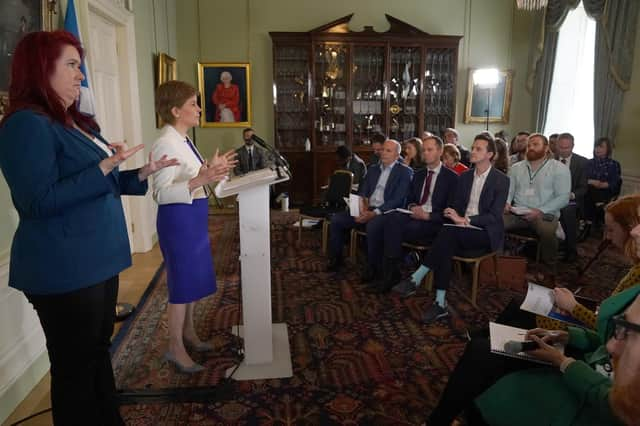Scottish independence: Nicola Sturgeon is spouting publicly funded SNP propaganda that any half-alert 12-year-old could see through – Brian Wilson


Tireless in the service of our readers, I ploughed through this latest cut-and-paste rehash of tendentious arguments, lumped together under the snappy title: “Renewing Democracy through Independence.”
If one could bother to be offended, it is actually offensive for this stuff to be churned out at public expense in the midst of spending cuts, entirely to keep Ms Sturgeon’s mug on the telly and convey the impression of momentum to her more deluded followers.
Advertisement
Hide AdAdvertisement
Hide AdIt is entirely a matter for the Scottish National Party if they wish to spend their summer producing these tracts and, if they so choose, colouring them in. Whether the public purse should fund blatant propaganda, devoid of balance or analysis, is another question.
Take for example the section on EU membership which states: “With independence, Scotland would be able to apply to re-join the EU as soon as possible, and thereby benefit from being part of the world's largest single market.” A semi-alert 12-year-old could spot the non sequitur.
“Applying to rejoin” is not “joining” and “thereby” leads to nothing. States with their own secessionist movements remain implacably opposed. And there is a queue – Turkey (applied in 1987), North Macedonia (2004), Montenegro (2008), Albania (2009), Serbia (2009), recently Ukraine and Moldova.
In the 2014 fantasy White Paper, all this was dismissed with the blithe claim that Scotland will “continue to be a member of the EU”. However credible that might have been then (ie, not very), the indisputable fact is that the “continuity” argument no longer exists.
The SNP are entitled to wish away these impediments. However, it is an abuse of civil service independence to advance a baseless contention without any assessment of the much more likely prospect – that Scotland would remain outside the EU indefinitely while also removing itself from the UK which, while not “the world’s largest market” happens to be the one which accounts for two-thirds of Scotland’s trade.
One perspective the document pretends does not exist is the distinctiveness of Scottish legislation prior to devolution and the positive legacies it bequeathed. Political devolution built on that history and ignoring it promotes the false premise – essential to nationalism - that outcomes are dependent on constitutional status rather than the calibre and ideology of politicians.
Schools education is an obvious example. Scotland’s reputation as a world leader was established long before Holyrood was heard of. The opportunity was there to further enhance it.
Instead, the Salmond/Sturgeon years will be remembered for widening attainment gaps and withdrawing from international comparators because they had become such an embarrassment.
Advertisement
Hide AdAdvertisement
Hide AdOr take land reform, a subject close to my own heart. This paper attributes the advances made in the 2003 Act to devolution having “provided the opportunity for Scotland to make different and distinct choices” as if none of these previously existed, dependent on the complexion of government.
In fact, far more radical land reform measures, from 1886 onwards, were legislated for at Westminster and, while the 2003 Act was a good stepping-stone, the question which this paper avoids is why next to nothing has happened for the past 15 years? That is not due to a constitutional impediment but a complete lack of political interest.
And so on through the card. The right of Scotland to do things differently is long-established. In some policy areas, we were more progressive than the rest of the UK. In other respects, liberal progress as well as generous funding relied on being part of the larger entity. Politicians made the difference, more than constitutional status.
Devolution provided the opportunity for the Scottish Government to do more things better and that is the test Ms Sturgeon cannot face up to. The pretence that this must be a permanent argument about the constitution rather than political vision, competence and intent may eventually wear thin.
If the cameras ever stopped turning up at Bute House for non-events, the illusion would quickly collapse.
Comments
Want to join the conversation? Please or to comment on this article.

